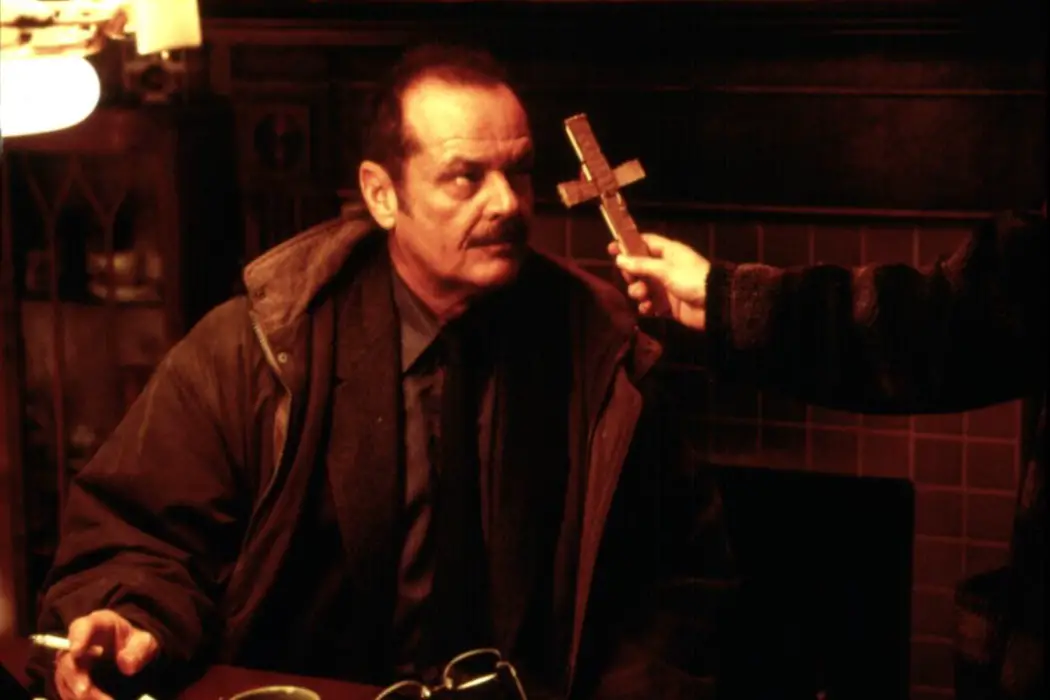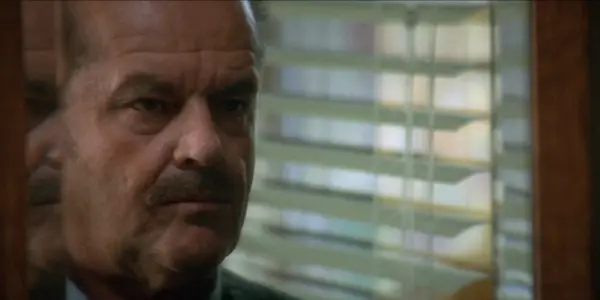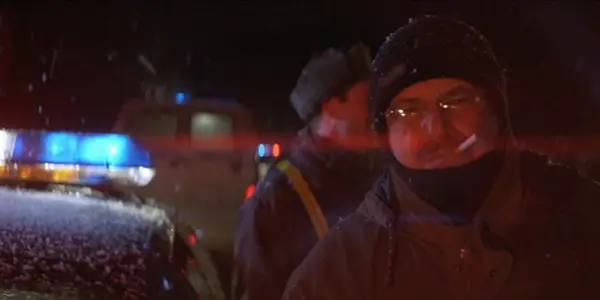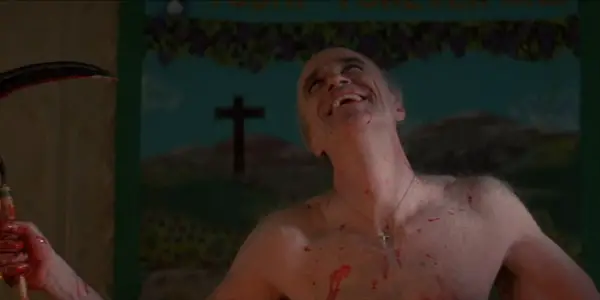Once A Cop: The End Of Identity In THE PLEDGE

Freelance writer based in London. Pacino fanboy and trash connoisseur.
On his last day as a detective before retiring, grizzled veteran Jerry Black (Jack Nicholson) trudges aimlessly around his now-featureless office, looks out of his window, and notices an old man on the street using a walking frame. It’s not a sight that he wants to see — it’s a harbinger of the frailty that’s to come, the fading vitality, the lost independence. He averts his eyes, preferring to look instead at the pictures of his youth that still sit unpacked on his desk, portals to the past preserved in nostalgic black-and-white — but these bring him no comfort. Those days are over, and as Jerry looks into the mirror, the face that stares back at him seems to ask: Who even are you anymore?
The answer, Sean Penn‘s The Pledge suggests, is: Nobody. Where other character studies flesh out their protagonists with environments that are busy with detail, Penn‘s film is defined by absences and voids. Those old photos in uniform, and the fishing rod that leans against the wall, are the only discernible traces of Jerry’s history. One job, one hobby, no wife, no friends, no family — a lone wolf without a cub.
Jerry Black, we sense, is a policeman first, and a human last — the kind of man whose head contains more case files than happy memories, whose world doesn’t make sense when it’s not cordoned off with crime scene tape. Retirement from the force isn’t just the end of his career — it’s the annihilation of his entire identity. Without his badge and his gun, does he even exist?
Pennpoint Precision
Sean Penn will justifiably be remembered as a great actor (his cocaine-addled frenzy in Carlito’s Way, his salmonella-raw fury in Mystic River, and his mumbled melancholy in The Tree of Life, are all screen-burning showcases of his talent), but not as a great director — his oeuvre so far is too thin, too scattershot. At his best, he’s an admirably sturdy craftsman (see The Indian Runner, his directorial debut, a thoughtful drama inspired by the Bruce Springsteen song “Highway Patrolman”). At his worst, he’s immeasurably atrocious (see The Last Face, his latest effort, one of the ghastliest films ever made). It’s somewhat fitting, I suppose, that the filmography should be as volatile as the man himself.

The Pledge, which turns 20 this year, remains Penn‘s crowning achievement behind the camera — a formally precise depiction of slipping sanity, of the perils that surface when a man’s entire sense of self-worth is tethered with fragile skin to his profession. Some of Penn‘s images here are as thematically dense as those of the very best neo-noir filmmakers, capturing the existential dread of a man clawing desperately at whatever’s left of his old life.
Just look at the silky slow-mo shots of Jerry’s retirement party, elegantly lensed by cinematographer Chris Menges. Jerry’s colleagues dominate the frame, their blissful faces and grooving bodies rendered clear and crisp, warmly illuminated, while Jerry floats without company in the obfuscated foreground — an empty, out-of-focus island in an ocean of communal ecstasy. That tidal wave of loneliness is only intensified by Jay Cassidy‘s editing, cross-cutting between the dance floor and the discovery of a murdered young girl in the snow — retirement is death, and Jerry’s a dead man.
Or maybe not just yet. Leaving his own party, or perhaps his own funeral, to examine what will surely be his last ever crime scene, Jerry undergoes a startling transformation — haze gives way to clarity as he prowls upon familiar territory, his domain. Observing the investigation process with experienced eyes, he’s disgusted by the conspicuous incompetence of the cops around him, one of whom drops a pen on the ground near the body, another of whom needs to be instructed to check the victim’s coat for fingerprints. This is where Jerry belongs, where he’s always belonged — down in the dirt with the cadavers and evidence bags, analysing unspeakable horrors without much feeling at all.

That sort of juxtaposition, in Penn‘s deft visual scheme and in Nicholson‘s nuanced performance, serves as the foundation for the film’s emotional architecture — Jerry’s is a world of extremes, of chasms and schisms. When he’s cornered into a social environment, Jerry’s a husk — when he’s on the job, officially or unofficially, he’s infused with purpose. Nicholson is especially sensitive to the way in which that emotional rupture is manifested in behavioural rupture — Jerry’s eyes wander and dart nervously around the room when he’s delivering his staccato retirement speech, but then fixate with laser focus when he’s steadily delivering bad news to the parents of the murdered child. There’s something quite disturbing about that particular divide — it’s as if he’s seen so much grief, and so little celebration, that the former has become distinctly more comfortable than the latter.
Out with the Old, in with the New
It’s not just Jerry’s inner life that’s falling apart. Without ever making straightforward announcements about intergenerational tensions, The Pledge reveals itself to be about a specific cultural apocalypse, as the encroaching age of the arrogant, aggressive modern cop sounds the death knell for old values in the world of law enforcement. Jerzy and Mary-Olson Kromolowski‘s screenplay surrounds Jerry with signs of methodological and ethical decay, of a workplace in which cut-throat — and consequently thoughtless — efficiency has become the name of the game. As he watches his successor, Stan Krolak (Aaron Eckhart), bully a meaningless confession out of an intellectually disabled suspect, Jerry realises that interrogation isn’t about arriving at the truth anymore — it’s about arriving at the most convenient solution so that everybody can be home for dinner on time.
A lesser film might seek to ennoble or sanctify Jerry for his continued diligence, but The Pledge never commits to such reductive binaries — instead, Jerry’s despair at the vitiation of sacrosanct integrity in policing is undercut and made thorny, even queasy, by moments in which his own pitch-black pathology bubbles to the surface. What’s etched into Jerry’s face as he listens to a young cop describe the electrifying adrenaline rush of seeing a child whose throat has been slit? Disdain, certainly, but also an unsettling degree of identification—Jerry might be anaesthetised to the young cop’s brand of cheap thrills, but he must recognise that on some level his own dependence on the perpetuation of evil is just as nauseating.
God is a Policeman
After all, for whom is he really trying to solve this case, long after his official retirement? The murdered girl’s mother, Margaret Larsen (Patricia Clarkson), ostensibly — it’s she who makes Jerry swear the titular pledge, by his soul’s salvation, on a cross made by her daughter, to find the killer. But we never really get the sense that the divine import of that pledge means as much to Jerry as it does to Margaret if it even means anything to him at all. The closest thing he has to a cross on his wall is a Marine Corps plaque, he never prays, and his only visit to the church is tangled up in violent delusion, as he imagines himself shooting the local pastor, whom he suspects of being the killer.

If Jerry has a God, he’s probably dressed in police uniform — Father, Son, and Holy Cop. His pledge is more of an excuse than a promise, more selfish than sacred — as long as he still has a reason to keep investigating, he still has a reason to keep living. Even when it seems as if he’s successfully managed to restructure his life around a surrogate family, consisting of abused waitress Lori (Robin Wright) and her daughter Chrissy (Pauline Roberts), his fate remains inextricably bound to that of the killer. And as the family grows more intimate, Jerry’s intentions, his impulses, grow more troubling.
Fritz’s Fire
Apart from a few instances of whirlwind editing, which confirm the total disintegration of Jerry’s psyche, the second half of The Pledge never quite matches the visual sophistication of the first—but there’s one shot, of a child’s balloon floating eerily away, that raises an interesting point of intertextual comparison. It’s an image that consciously evokes Fritz Lang‘s 1931 procedural masterpiece, M — another film about the pursuit of a murderer of children, in which a drifting balloon appears as a sign of hideous violence. Structurally, the two films couldn’t be more different — The Pledge is animated by the obsession of an individual operating outside of a disinterested institution, while M is animated by the wrath of the collective, the mobilisation of an entire city, the activation of every possible resource.
But there’s a psychological parallel here — not between Jerry and the German police, but between Jerry and the serial killer, Peter Lorre‘s Hans Beckert, who at the climax of Lang‘s film is forced to appear in front of a kangaroo court by the criminal underworld that converges upon him. In a desperate defence of himself, Beckert describes a cursed thing inside of him — a fire, a voice, an agony — which overrides all other mental faculties, eradicates choice, and compels him to destroy the lives of others. A fire, a voice, an agony — put Jerry Black in front of that same court, ask him why, in the end, he imperils the life of one innocent child in order to avenge another, and you might just extract a similar answer.
Watch The Pledge
Does content like this matter to you?
Become a Member and support film journalism. Unlock access to all of Film Inquiry`s great articles. Join a community of like-minded readers who are passionate about cinema - get access to our private members Network, give back to independent filmmakers, and more.











